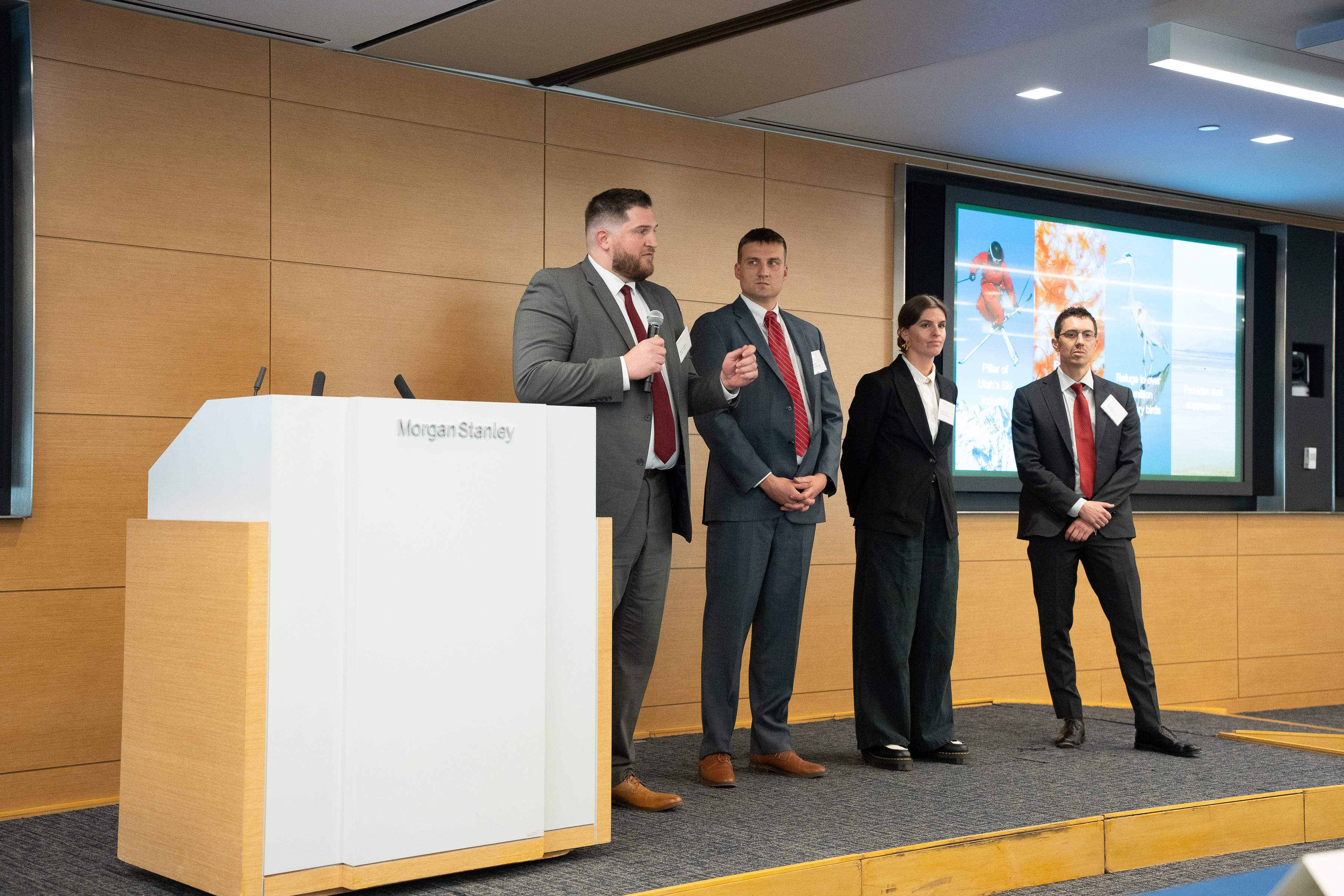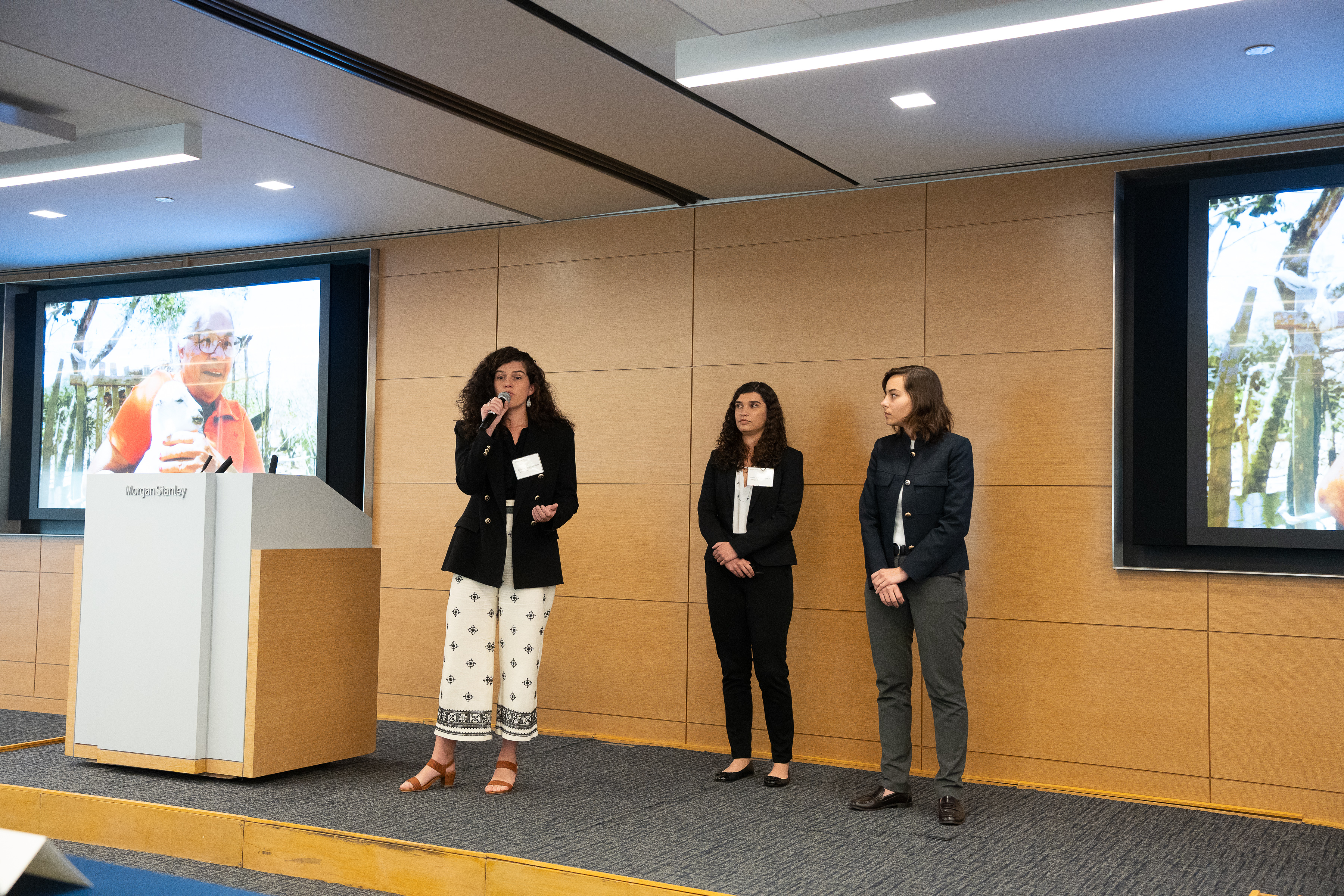Students from the David Eccles School of Business at the University of Utah won the 2024 Kellogg-Morgan Stanley Sustainable Investing Challenge with their idea to fund irrigation efficiency projects to help prevent the Great Salt Lake from drying up.
After a daylong competition in New York City, graduate students from David Eccles School of Business at the University of Utah won the 14th annual Kellogg-Morgan Stanley Sustainable Investing Challenge for their proposal to fund irrigation efficiency projects to help prevent the Great Salt Lake from drying up.
A team from IESE Business School at the University of Navarra came in second place with their plan to provide farmers in the Caatinga region of Brazil with working capital loans, and a team from Columbia Business School won third place with their idea to create asset-backed securities to securitize and mobilize private capital for renewable energy development in Africa.
The annual Challenge, presented by Northwestern University’s Kellogg School of Management and Morgan Stanley’s Institute for Sustainable Investing, invites graduate students from around the world to pitch their ideas that can leverage capital markets to address social and environmental issues. This year’s 12 semifinalist teams proposed diverse plans aiming to create impact in more than 25 countries, from reducing the shrimp farming industry’s environmental impact in Southeast Asia to increasing access to electricity in Nigeria.
“Through the Sustainable Investing Challenge, students develop financial solutions to real-world issues, providing them with invaluable experience and insights into sustainable finance,” says Jessica Alsford, Morgan Stanley’s Chief Sustainability Officer and CEO of the Institute for Sustainable Investing. “As the demand for sustainability talent grows across industries, we’re excited to help cultivate a pipeline of emerging leaders committed to driving the transition to a more sustainable future.”
Resilient Waters Fund Takes 1st Place
Cody Clifford, Hunter Conrad, Michael Hall and Alex Parlogean of the Resilient Waters Fund captured the judges’ votes to secure the first-place prize of $10,000. The Fund partners with existing government programs and the Utah Agricultural Land Trust to fund irrigation efficiency projects and lease farmers’ and irrigation companies’ water rights. To make a return, the Fund leases these “water shares” vis-à-vis the Trust to the Utah State Government to then be diverted to the Great Salt Lake, a keystone ecosystem and economic engine at significant risk of drying up in the next five years. Their proposal would catalyze federal, state and investment funds through a creative land trust mechanism that would spur irrigation efficiency, responsible cropping and water savings with the aim of helping to protect the Great Salt Lake.

The Caatinga Bank team, including Gabriela Ferreira Galera, Luana Gomes Nogueira, Carolina Pascotto and Danielle van Drunen, won the runner-up prize of $5,000 with their plan to provide farmers in the Caatinga region of Brazil with working capital loans in the form of seeds, resources, technical knowledge and cash. The proposal will partner with agricultural cooperatives and also serve as a broker intermediating the negotiation of agricultural future contracts, which reduces risk and generates additional revenue streams.

Ignacio Aguirre, Nadim Dabbous, Dion Koreman and Diego Rehder of the Renewable Back Security (RBS Capital) team won the third place of $2,500 with their plan to reduce the cost of capital necessary for emerging and developing economies (EMDEs) to scale up renewable energy adoption. Targeting the need for increased access to capital for clean and renewable energy in southern and central Africa and in the U.S., RBS Capital would create asset-backed securities with geographic diversification to securitize and mobilize private capital for project development with a risk-adjusted return.

Snapshot of the Global Competition
This year’s Sustainable Investing Challenge received submissions from 84 teams from all over the world, each with unique and innovative proposals to solve global environmental and social issues. The 12 semifinalists were selected by volunteers from the sustainable investing community, who also participated as judges and mentors to students in the competition. After traveling to Morgan Stanley’s New York headquarters to pitch their ideas in person to a panel of sustainable finance experts and senior practitioners across the industry, only three teams were chosen to advance to the finals.
“Every year, these teams of graduate students demonstrate incredible creativity and drive with their solutions to global problems,” says Dave Chen, Professor of Finance at Kellogg Management School, CEO of Equilibrium Capital and the founder of the Sustainable Investing Challenge. “This year’s winner and runners-up are no different, and we are excited to support them in helping make their ideas a reality.”
The additional nine semifinalist teams were:
ASEAN Green Steel Fund (AGSF)
- Proposal: AGSF proposes a creative linking of agricultural waste to the clean fuel needs of the steel industry in Association of Southeast Asian Nations (ASEAN) countries to significantly decrease greenhouse gas emissions from both industries..
- School: University of Melbourne, Monash University, University of Technology Sydney
Blue Roots Fund
- Proposal: The fund aims to finance the sustainability transition of the shrimp industry, protect mangroves and unlock blue carbon credits in Indonesia, paving the way for expansion across the shrimp industry globally.
- School: University of St. Gallen
Clean Ascent Fund
- Proposal: This team seeks to accelerate the green transition in the U.K. by engaging new industries and players to drive resources into upskilling in affected communities, green project acceleration and an adherence to just transition principles.
- School: University College London
Climate Change Resilience REIT
- Proposal: Climate Change Resilience REIT has identified a creative path to support financially distressed American homeowners, increase climate resilience measures and decrease climate and financial risk exposure for investors through strategic diversification.
- School: University of St. Gallen
Community 4 Resilience Fund
- Proposal: The fund would finance decentralized microgrid development in the U.S., leveraging renewable energy certifications and carbon credits, and an investment approach that combines higher- and lower-risk investment phases and harnesses homeowners’ associations as residential hubs.
- School: UCLA Andersen School of Management
Diaspora Fund for Sustainable Energy
- Proposal: This team plans to harness diaspora investments in Nigeria to fund community solar farm development through a blended finance approach and a lease model for transferred ownership.
- School: Mohammed VI Polytechnic University, University of Colorado, Boulder
Nearshore Manufacturing ESOP Fund (NMEF)
- Proposal: This solution would spur wealth transfer to workers in Mexico’s manufacturing sector through a creative employee stock ownership plan (ESOP) fund structured to attract outside capital.
- School: Kellogg School of Management, Northwestern University
Prickly Power Fund
- Proposal: Prickly Power Fund helps local Maasai communities in Kenya overcome capital constraints through equipment leasing and offtake agreements that use Kenyan invasive cacti to scale up biofuel and feed projects while simultaneously restoring grazing lands.
- School: Schulich School of Business, York University
The Green Inset+ Fund
- Proposal: The Green Inset+ Fund proposes moving beyond carbon offsetting by increasing corporate value chain “insetting” projects that reduce carbon emissions in their own supply chains, which enable co-investments from institutional investors.
- School: Tufts University



